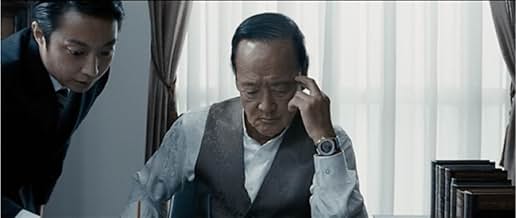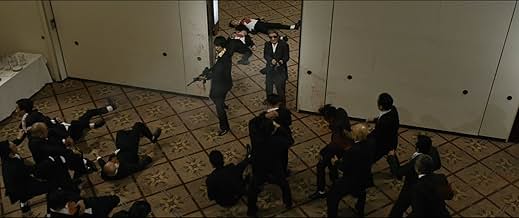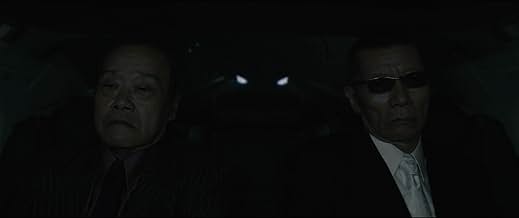Füge eine Handlung in deiner Sprache hinzuFive years after surviving the all-out war between the Sanno and Hanabishi crime families, former yakuza boss Otomo now works in South Korea for Mr. Chang, a renowned fixer whose influence e... Alles lesenFive years after surviving the all-out war between the Sanno and Hanabishi crime families, former yakuza boss Otomo now works in South Korea for Mr. Chang, a renowned fixer whose influence extends into Japan. A relatively minor incident causes tensions to rise between Chang Enter... Alles lesenFive years after surviving the all-out war between the Sanno and Hanabishi crime families, former yakuza boss Otomo now works in South Korea for Mr. Chang, a renowned fixer whose influence extends into Japan. A relatively minor incident causes tensions to rise between Chang Enterprises and the faraway powerful Hanabishi. The growing conflict gets out of hand and ignit... Alles lesen
- Auszeichnungen
- 2 Gewinne & 4 Nominierungen insgesamt
- Otomo
- (as Beat Takeshi)
Empfohlene Bewertungen
Do what you do well and never let anybody lure you to the wrong side, always someone wants something from you but be sure that it is the right things.
Never let slows minds slow you down.
There is a lot of violence but that is to be expected. There is also a lot of crazy connections and intriguing going on. People betraying others, but also some trying to do the honorable thing. Power corrupts ... absolute power corrupts absolutely. Or something along those lines. Also some things seem inevitable, like what goes around comes around. Karma is catching up most of the time - even when it feels not deservedly.
The second Outrage movie built a more intricate set-up and story, that justified the 2nd half of the film scenes.
The third and final part, Coda, is about the clash between traditional / old-school yakuza versus modern, petulant yakuza.
It's about honor and respect of the code versus greed, constant betrayal and perversity.
The movie features better written dialogues than in the previous two parts, and an interesting take on how modern society might affect yakuza businesses.
Kitano's character, Otomo, follows the traditional code of honor of the yakuza, to the end. It was a beautiful story.
Note that the scenario doesn't actually consider the modern spirit to be negative in all circumstances: Otomo's boss, Chang, is a business man who has embraced modernity, and who does not condone violence.
Kitano delivered an amazing trilogy.
That said, I strongly recommend you watch this immediately after watching the first 2 films. At the very least, Kitano's character's lingering resentment from those films may carry over and round out his character in this film.
The plot in all three movies is basically the same. Yakuza families trying to rise above other Yakuza families. After each dead, a Yakuza family seeks revenge against another family. All of them plot against each other. That's it.
Looks like Takeshi was bored to think of a more interesting plot. I don't know..Some twists in it maybe could help. Some more of that dark humor present here and there would also help. But unfortunately, the overall taste left on me after watching all three movies, is that there is nothing to remember afterwards. At some point even the background music looks like it is totally out of place.
Regarding positives, the actors who played the Yakuza bosses and underbosses all play their parts well. And there are scenes with subtle black humor that made me laugh genuinely. Lastly, these movies do show the vanity of the gangster universe. Sure you can rise to the highest peak in a crime syndicate, but at the end of the day you are nothing but an expendable tool yourself. And each passing day only brings your downfall closer.
I would keep the best ideas from all three movies and i would think of a better plot for a single movie. Three movies with so many similarities between them, for me this is kind of an overkill.
Not among Takeshi's best.
Wusstest du schon
- WissenswertesThe meaning of coda for this movie can be seen as having 2 meanings: 1. the closing section of a musical composition / A few measures added beyond the natural termination of a composition. / concluding section of a musical or literary composition; something that rounds out, summarizes, or concludes / the concluding passage of a piece or movement, typically forming an addition to the basic structure. / an ending part of a piece of music or a work of literature or drama that is separate from the earlier parts / something that ends and completes something else 2. The honor code (of the Yakuza)
- VerbindungenFollows Outrage (2010)
Top-Auswahl
- How long is Outrage Coda?Powered by Alexa
Details
Box Office
- Weltweiter Bruttoertrag
- 11.983.269 $
- Laufzeit
- 1 Std. 44 Min.(104 min)
- Farbe
- Sound-Mix
- Seitenverhältnis
- 2.35 : 1

























